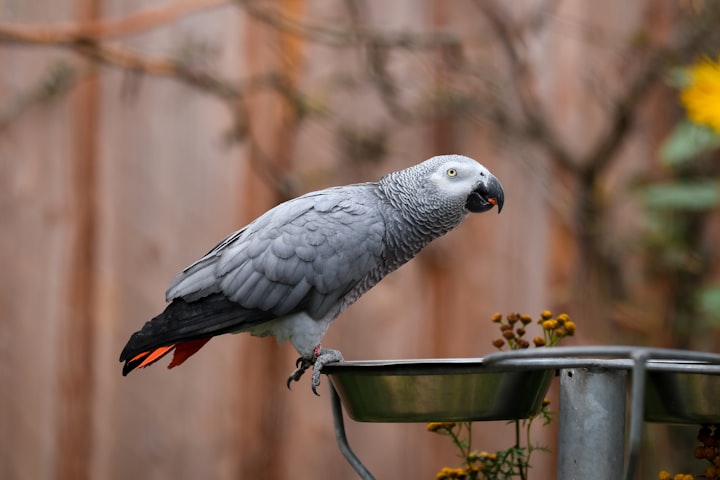African Grey Parrot Lifespan: How Long Do African Grey Parrots Live?
Natural Habitat

African Grey Parrots are native to the rainforests of West and Central Africa and are renowned for their intelligence, beauty, and ability to mimic human speech. These remarkable birds belong to the Psittacus genus and are easily recognizable by their distinctive grey feathers, bright red tails, and sharp, curious eyes. They have been kept as pets for centuries, capturing the hearts of bird enthusiasts and casual admirers alike.
African Grey Parrots have an impressive lifespan, especially compared to other parrot species. How long do African Greys live? In the wild, these parrots live for up to 60 years, though predation and habitat loss can reduce their lifespan. In captivity, these intelligent birds can live for 60 to 80 years or even longer with proper care and attention. This makes them lifelong companions for their human caretakers, with some even outliving their original owners.
As a potential or current African Grey Parrot owner, it's essential to understand the factors that contribute to their longevity. Proper care, including a balanced diet, appropriate housing, socialization, and regular veterinary checkups, can significantly impact the lifespan of these beloved birds. By gaining insight into the secrets behind their long lives, you can ensure that your African Grey Parrot thrives and remains a healthy and happy companion for many years.
This blog will explore the factors contributing to the remarkable longevity of African Grey Parrots, offering tips and advice to help you provide the best possible care for your feathered friend.
Natural Habitat and Lifespan - African Grey Parrot
African Grey Parrots are native to the dense rainforests of West and Central Africa, with a range that spans countries such as Angola, Cameroon, Congo, Côte d'Ivoire, Ghana, and Nigeria. They thrive in primary and secondary rainforests, gallery forests, forest edges, and cultivated areas. The lush, diverse, and resource-rich environment of these tropical rainforests provides ample food, shelter, and opportunities for socialization, all essential components for their survival and well-being.
Also Read: Is F3 Savannah Cat the Right Pet for You?
The natural habitat of African Grey Parrots plays a significant role in their lifespan. Access to various food sources, including fruits, seeds, nuts, and insects, contributes to a balanced and nutritious diet that supports their overall health. Furthermore, the complex social structure within wild populations of African Greys promotes mental and emotional well-being, which is crucial for maintaining a healthy and long life. However, the challenges that wild African Greys face, such as predation, disease, and habitat loss due to deforestation, can adversely impact their lifespan.
How Long Do African Grey Parrots Live?
African Grey parrots in the wild can live up to 60 years, but their average lifespan may be reduced due to the above mentioned challenges. On the other hand, when provided with proper care, captive African Greys can live much longer, with lifespans ranging from 60 to 80 years or more. In captivity, these intelligent birds are protected from predators, have access to a consistent and balanced diet, and receive regular veterinary care, all contributing to their increased longevity.
However, it's important to remember that captive African Greys still require an environment that mimics their natural habitat as closely as possible, including opportunities for socialization, mental stimulation, and exercise, to ensure their overall health and happiness.
Diet and Nutrition
A balanced diet is crucial for African Grey Parrots' overall health and longevity. Wild African Grey Parrots consume diverse foods, including fruits, seeds, nuts, and insects, providing them with the necessary nutrients for growth, development, and maintaining a robust immune system. In captivity, it's essential to replicate this varied diet to ensure that your African Grey receives all the nutrients it needs to thrive and live a long, healthy life.
To support the health and longevity of your African Grey Parrot, it's vital to provide them with a diet rich in essential nutrients. Some key nutrients to focus on include:
- Protein: A crucial component for tissue growth, development, and repair. Protein sources include legumes, nuts, and small amounts of lean-cooked meat or fish.
- Vitamins and Minerals: They require a variety of vitamins and minerals for optimal health, including vitamins A, C, D, E, and K, as well as calcium, phosphorus, and other trace minerals. Fresh fruits, vegetables, and leafy greens are excellent sources of these essential nutrients.
- Carbohydrates: As an energy source, carbohydrates should comprise a portion of your African Grey diet. Grains like brown rice, quinoa, and barley can provide healthy carbohydrates and additional nutrients.
- Fats: Healthy fats, such as those found in nuts and seeds, are essential for maintaining the integrity of your parrot's feathers, skin, and nervous system.
While a well-balanced and varied diet should provide most of the nutrients for your African Grey Parrot, dietary supplements can sometimes be beneficial to ensure your bird receives optimal nutrition. Calcium supplements, for example, can help support strong bones and prevent calcium deficiency, a common issue in captive parrots. Vitamin D3 supplements can also be helpful, particularly for birds that do not have access to natural sunlight.
Before introducing any supplements to your bird's diet, it's essential to consult with an avian veterinarian to ensure that they are necessary and will not cause any adverse effects. Over-supplementation can lead to health issues, so following your veterinarian's advice and monitoring your parrot's health closely is crucial.
Socialization and Mental Stimulation
African Grey Parrots are highly social creatures that thrive on interaction with their kind and humans. They live in large flocks in the wild, engaging in complex vocalizations and behaviors that facilitate solid social bonds. Pets need regular social interaction and mental stimulation to maintain their emotional and cognitive health. Without proper socialization, these intelligent birds can become lonely, bored, and prone to behavioral issues or self-mutilation.
Also Read: How to Care for Your Calico Cat
Socialization is crucial for the overall well-being and longevity of African Grey Parrots. Regular interaction with humans and, if possible, other birds help keep them mentally and emotionally stimulated, reducing the risk of stress, depression, and anxiety. A happy and content African Grey is more likely to live a longer and healthier life. Additionally, socialization and bonding with their human caretakers can help improve the quality of life for the parrot and its owner, as it fosters trust and a strong bond.
In addition to social interaction, mental stimulation is essential for the well-being of African Grey Parrots. Boredom and lack of inspiration can lead to stress, anxiety, and the development of negative behaviors, such as feather plucking or excessive vocalization. To ensure your bird remains mentally engaged, consider the following:
- Enrichment toys: Provide a variety of toys designed to challenge your parrot's problem-solving skills, such as foraging toys, puzzle toys, and shredding toys. Rotate the toys regularly to maintain their novelty.
- Training and trick learning: Use positive reinforcement techniques to teach your bird tricks and commands. This strengthens the bond between you and your bird and keeps its mind active and engaged.
- Environmental enrichment: Mimic your parrot's natural habitat by adding perches of various diameters, textures, and heights, as well as hiding treats or toys around their cage or play area to encourage exploration and foraging.
- Interactive play: Spend quality time interacting with your African Grey by playing games, talking, and allowing them to participate in your daily activities when appropriate.
By providing socialization and mental stimulation, you can significantly impact your African Grey Parrot's longevity and overall quality of life.
Proper Housing and Environmental Factors
A safe, clean, and comfortable living environment is essential for the health and longevity of African Grey Parrots. A well-maintained habitat reduces the risk of illness and injury, minimizes stress, and provides a space where your parrot can rest, play, and interact with you and other family members. Ensuring your African Grey's environment is clean, secure, and free from potential hazards is critical to their overall care.
To make the ideal habitat for your African Grey Parrot, consider the following tips:
- Cage size: Choose a spacious cage that allows your parrot to stretch its wings, climb, and play without restriction. A minimum cage size of 36 inches wide, 24 inches deep, and 48 inches high is recommended, though more prominent is always better.
- Cage construction: Opt for a sturdy cage made from non-toxic materials, with bar spacing appropriate for African Greys (approximately 3/4 to 1 inch). Avoid cages with sharp edges, peeling paint, or potential hazards.
- Perches: Provide a variety of perches with different diameters, textures, and materials to promote foot health and prevent pressure sores. Natural wood perches, such as manzanita or dragonwood, are excellent choices.
- Cage accessories: Equip your parrot's cage with toys, foraging opportunities, and hiding spots to encourage mental stimulation and physical activity.
- Cleanliness: Regularly clean your parrot's cage, perches, and accessories to minimize the risk of bacterial or fungal infections. Use non-toxic cleaning agents and ensure all surfaces are thoroughly rinsed and dried before returning your parrot to its habitat.
Maintaining appropriate temperature, humidity, and lighting conditions in your African Grey Parrot's living environment is crucial for well-being and longevity. Consider the following factors:
Temperature
They thrive in temperatures between 65 and 80 degrees Fahrenheit (18 to 27 degrees Celsius). Avoid sudden temperature fluctuations and ensure your parrot's cage is not located near drafts, air conditioners, or heating vents.
Humidity
Aim for a humidity level between 40% and 60%, as African Greys are native to humid rainforests. Use a humidifier or regularly mist your parrot's feathers with water to maintain appropriate humidity.
Lighting
Provide your African Grey access to natural sunlight or full-spectrum artificial lighting to support their circadian rhythm, vitamin D synthesis, and overall health. Avoid placing their cage in direct sunlight, as this can lead to overheating. Instead, ensure they receive indirect sunlight or use full-spectrum lighting designed for birds.
By providing your African Grey Parrot with a safe, clean, and comfortable living environment that meets their specific needs, you can significantly enhance their quality of life and contribute to their overall longevity.
Regular Health Checkups and Disease Prevention
Routine veterinary care is essential for maintaining the health and longevity of your African Grey Parrot. Regular checkups with an avian veterinarian can help identify potential health issues early, allowing for timely intervention and treatment. Establishing a relationship with a qualified veterinarian ensures that your parrot receives the best possible care and advice, which can significantly impact its overall well-being and lifespan.
African Grey Parrots can be susceptible to various health issues, which, if left untreated, can negatively impact their lifespan. Some common health concerns include:
- Psittacine Beak and Feather Disease (PBFD): A viral infection that causes feather loss, beak deformities, and a weakened immune system. Early diagnosis and management are crucial to minimizing the impact on your parrot's health.
- Respiratory infections: Caused by bacteria, fungi, or parasites, these infections can lead to breathing difficulties, lethargy, and loss of appetite. Timely treatment with appropriate medications is essential for recovery.
- Nutritional deficiencies: A lack of essential nutrients, such as calcium, vitamin A, or vitamin D3, can lead to various health problems, including weak bones, poor feather condition, and a weakened immune system.
- Feather plucking: Due to stress, boredom, or underlying health issues, feather plucking can lead to skin infections and other complications if not addressed.
To minimize the risk of health issues and provide a long, healthy life for your African Grey Parrot, consider the following preventative measures:
- Regular veterinary checkups: Schedule annual checkups with an avian veterinarian, or more frequently if advised, to monitor your parrot's health and address any concerns promptly.
- Balanced diet: Provide a varied and nutritionally complete diet to prevent deficiencies and support a strong immune system.
- Clean environment: Maintain a clean and hygienic living space for your parrot to reduce the risk of bacterial, fungal, or parasitic infections.
- Quarantine new birds: If introducing a new bird to your home, quarantine them for at least 30 days and have them examined by an avian veterinarian before allowing contact with your African Grey to minimize the risk of disease transmission.
- Monitor behavior: Keep a close eye on your parrot's behavior, appetite, and appearance for any signs of illness or distress. Consult your veterinarian immediately if you notice any changes.
Exercise and Physical Well-being
Physical activity is crucial in African Grey Parrots' overall health and longevity. Exercise contributes to maintaining a healthy weight, supporting muscle strength, promoting cardiovascular health, and preventing boredom and stress. The regular physical activity ensures that your African Grey Parrot stays in good physical and mental shape, contributing to overall longevity.
To ensure your African Grey Parrot gets enough exercise, consider the following tips:
- Supervised out-of-cage time: Allow your parrot to have daily supervised time outside their cage, in a safe and secure environment, to stretch their wings, explore, and interact with you and their surroundings.
- Flight exercise: If possible and safe, encourage your parrot to fly indoors in a dedicated bird-safe room or use a lightweight bird harness for controlled outdoor flights. Flight is a natural form of exercise that helps maintain overall health.
- Climbing and perching: Provide a variety of perches and climbing structures within your parrot's cage and play area to encourage movement and exploration.
- Interactive play: Engage your African Grey in interactive play sessions using toys, games, and training exercises that encourage movement and mental stimulation.
- Foraging opportunities: Encourage your parrot to work for its food by using foraging toys or hiding treats around its cage or play area, promoting physical activity and mental engagement.
Obesity can significantly impact the health and lifespan of African Grey Parrots, increasing the risk of heart disease, liver problems, and other health issues. To recognize and address obesity in your African Grey, keep the following in mind:
- Regular weight monitoring: Weigh your parrot regularly using a digital scale to track any changes in its weight and identify potential issues early.
- Balanced diet: Ensure your parrot receives a nutritionally balanced diet, avoiding high-fat treats and focusing on a variety of fruits, vegetables, and healthy protein sources.
- Portion control: Monitor your parrot's food intake and adjust portion sizes to maintain a healthy weight.
- Increase exercise: Provide more opportunities for physical activity to help your parrot burn excess calories and maintain muscle strength.
- Consult a veterinarian: If you suspect your bird is overweight or obese, consult an avian veterinarian for guidance on adjusting their diet and exercise routine to promote a healthy weight.
Promoting exercise and physical well-being can support your African Grey Parrot's overall health, contributing to a longer, happier life.
The Role of Genetics in Longevity
Genetics significantly affects African Grey Parrots' overall health and longevity. As humans, certain genetic traits can predispose parrots to specific health issues or impact their lifespan. Genetic factors can influence an African Grey's immune system, metabolism, and resistance to various diseases, affecting their longevity.
Responsible breeding practices are essential for maintaining African Grey Parrots' genetic diversity and health. Inbreeding, or the mating of closely related birds, can lead to a reduced gene pool and an increased risk of genetic disorders, which may negatively impact the parrot's health and lifespan. By selecting healthy, unrelated breeding pairs and avoiding overbreeding, breeders can contribute to the overall genetic health of the African Grey population, thereby promoting longer, healthier lives for these birds.
Researchers are working better to understand genetics' role in avian health and longevity. By studying the genetic makeup of African Grey Parrots and other bird species, scientists hope to gain insights into the factors contributing to their long lifespans and overall well-being. As our understanding of avian genetics grows, this knowledge may eventually lead to improved breeding practices, better disease prevention strategies, and more effective treatments for genetic disorders, ultimately contributing to longer, healthier lives for African Grey Parrots and other bird species.
Wrapping Up
African Grey Parrots are renowned for their intelligence, social nature, and impressive lifespans. Ensuring these remarkable birds enjoy long, healthy lives involves understanding and addressing the factors contributing to their well-being and longevity. You can significantly enhance your African Grey's quality of life by providing a balanced diet, proper housing, regular veterinary care, socialization, mental stimulation, and exercise opportunities.
Furthermore, recognizing the role of genetics in your parrot's health and supporting responsible breeding practices and ongoing research in avian genetics can help promote these captivating birds' overall health and longevity. With knowledge, dedication, and compassionate care, we can support the well-being of African Grey Parrots and ensure they continue to thrive, both in captivity and in the wild.
👉 Do you have any additional insights or questions? We highly value your feedback. Please share your thoughts by leaving a comment below.
Join today to share and publish your content on Vocal Media and earn money.
About the Creator
Amir Hossain
I blog on everything and anything— hoping my blogs will make your days a bit happier!






Comments
There are no comments for this story
Be the first to respond and start the conversation.